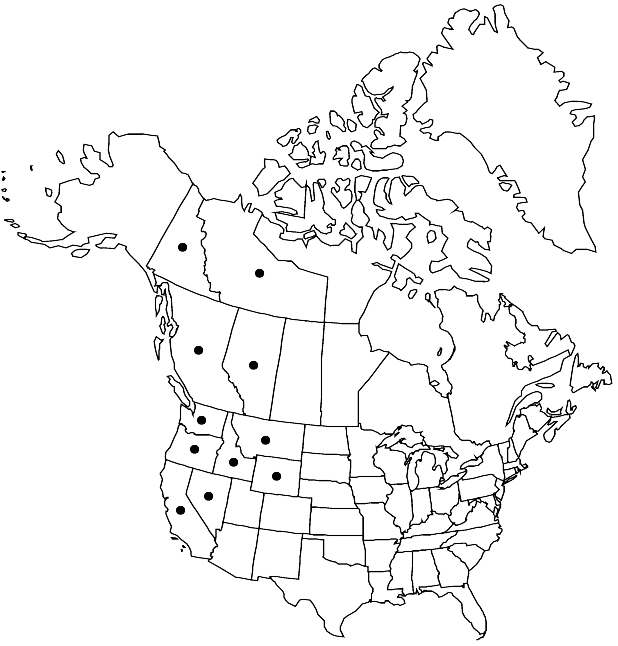Difference between revisions of "Draba praealta"
Pittonia 3: 306. 1898.
FNA>Volume Importer |
FNA>Volume Importer |
(No difference)
| |
Revision as of 22:54, 16 December 2019
Annuals or perennials; (short-lived); caudex simple or branched; not scapose. Stems branched or unbranched, (0.5–)0.8–3.2(–3.8) dm, pubescent throughout, trichomes 3–5-rayed, 0.1–0.4 mm, with simple and 2-rayed ones, 0.4–1 mm. Basal leaves rosulate; subsessile; petiole base ciliate, (trichomes simple and 2-rayed, 0.2–0.8 mm); blade oblanceolate, (0.7–)1–3.5(–4.5) cm × 1.5–7(–9) mm, margins usually dentate, rarely entire, surfaces pubescent, abaxially with stalked, 3–6-rayed trichomes, 0.1–0.5 mm, adaxially with stalked, 3–5-rayed, 0.1–0.6 mm, and simple ones, to 0.8 mm. Cauline leaves (1 or) 2–5(–9); sessile; blade ovate to lanceolate, margins dentate or entire, surfaces pubescent as basal. Racemes (5–)8–30(–37)-flowered, ebracteate, elongated in fruit; rachis not flexuous, pubescent as stem. Fruiting pedicels divaricate-ascending to ascending or suberect (not appressed to rachis), straight, (3–)4–10(–12) mm, pubescent, trichomes 3–5-rayed (0.1–0.4 mm), and sometimes simple. Flowers: (late-season ones petaliferous); sepals ovate, 1.7–2.5 mm, pubescent, (trichomes simple and stalked, 2-rayed); petals white, oblanceolate to spatulate, 2.8–3.5(–4) × 0.8–1.2 mm; anthers ovate, 0.2–0.3 mm. Fruits (erect, not appressed to rachis) lanceolate to linear-lanceolate, plane, flattened, (5–)7–12(–15) × 1.5–2.5(–3) mm; valves puberulent, trichomes simple and short-stalked, 2–4-rayed, 0.05–0.25 mm; ovules (24–)30–52 per ovary; style 0.03–0.1(0.15) mm. Seeds oblong, 0.8–1.1 × 0.5–0.6 mm, (often apiculate). 2n = 56.
Phenology: Flowering Jun–Aug.
Habitat: Rocky pine slopes, subalpine areas, alpine meadows, grassy volcanic ridges, woodlands, damp rocky areas, limestone talus, shale cliffs, steep hillsides
Elevation: 1200-2900 m
Distribution

Alta., B.C., N.W.T., Yukon, Calif., Idaho, Mont., Nev., Oreg., Wash., Wyo., e Asia (Russian Far East [Chukchi Peninsula]).
Discussion
Morphological and chromosomal evidence (M. D. Windham, unpubl.) suggests that Draba praealta may be an allopolyploid originating through hybridization between D. albertina and D. cana. Both R. C. Rollins (1993) and N. H. Holmgren (2005b) placed D. lonchocarpa var. dasycarpa in the synonymy of D. lonchocarpa. G. A. Mulligan (1974) indicated that the type of var. dasycarpa does not belong to that species and he correctly annotated its isotype (Macoun 64454, CAN) as D. praealta. Mulligan (1976) and Rollins indicated that D. praealta occurs in Alaska, but we have not seen unequivocal material from the state.
We have not seen the material on which A. E. Katenin and V. V. Petrovsky (1995) based their record from the Russian Far East.
Selected References
None.